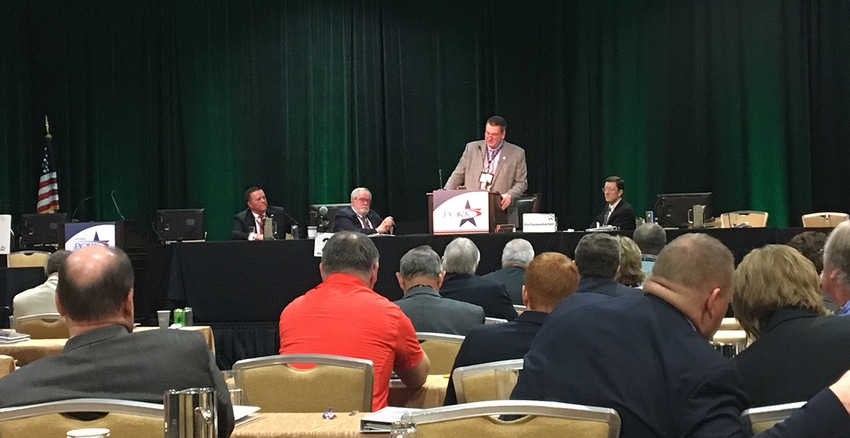One resolution passed directs NPPC to work with the USDA and FDA on restricting imports of soy-based animal feed products from countries with a high risk of transmitting FADs.
March 8, 2019

Protecting the United States from foreign animal diseases was top of mind this week during the National Pork Industry Forum in Orlando. National Pork Producer Council's delegates adopted several important resolutions regarding FADs as well as other industry issues such as livestock hauling, farm labor and cell-based meat:
Strengthen pork industry efforts to prevent FADs from entering the United States. Separate resolutions were adopted, directing NPPC to: work with the USDA and FDA on restricting imports of soy-based animal feed products from countries with a high risk of transmitting FADs; urge USDA and other public and private research institutions to evaluate FAD virus viability in pig feed and feedstuffs and to develop hold times for imported feed; and work with the National Pork Board, USDA, FDA and the U.S. Department of Homeland Security on coordinating with Canada and Mexico development of practices to protect the North American swine herd from FADs. A related resolution calls for exploring options for mitigating the impact of diseases on the pork industry and to review disease monitoring and control efforts.
Work for a change to the U.S. Department of Transportation's Hours of Service rules that allows livestock haulers to not have counted against their "on-duty" time periods when animals are being loaded and unloaded, when they must remain in their trucks. The HOS regulation limits certain commercial truckers to 14 consecutive hours of on-duty times; drivers reaching that limit then must take a 10-hour rest break. For biosecurity reasons, many livestock haulers must remain in their trucks during loading and unloading of animals.
Urge the U.S. Department of Labor and Department of Homeland Security to expand visas to allow foreign workers to stay in the United State longer so farm operations have a more reliable work force. U.S. agriculture currently is facing a severe labor shortage.
Monitor USDA and FDA to ensure the agencies are transparent throughout the development, production and harvest of laboratory-produced cultured protein. The agencies recently agreed to joint oversight of L-PCP, with FDA overseeing cell collection, cell banks and cell growth and differentiation and USDA overseeing the production and labeling of food products derived from the cells of livestock and poultry.
Identify existing and emerging pork industry issues and the funding needs to address them. Recommendations, including budget requirements, are to be provided to state associations prior to the 2020 Pork Forum.
“These resolutions reflect the concerns of the U.S. pork industry and the efforts we need to take to protect the livelihoods of producers,” says NPPC President David Herring. “NPPC will work with Congress, the Trump administration and others to tackle these and other issues of importance to our industry.”
Source: National Pork Producers Council, who are solely responsible for the information provided, and wholly owns the information. Informa Business Media and all its subsidiaries are not responsible for any of the content contained in this information asset.
About the Author(s)
You May Also Like



